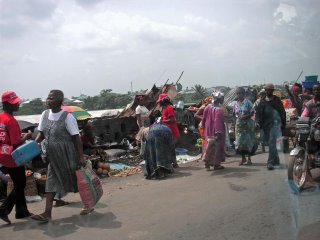skip to main |
skip to sidebar
Eleme Junction
Everytime I leave somewhere people say that they will miss me and how sad they are that I am leaving. It's good for the ego. And I still email and visit with these people whenever I can - as demonstrated by this next few weeks - friends in 6 countries all across the world planning to take me out and look after me and genuinely want to spend the short time I have with them with me. That is why I am lucky. I know good people. I learn something from the good people that I meet - interesting, intelligent, experienced and inspirational people everywhere I go. People that teach me something, make me think something that influences the way I view the world. I don't know yet what the gross inequities and extremes of environment that I see teach me. So I'm open to suggestions as to what Eleme Junction teaches a person. Eleme Junction, the bane of traffic in Port Harcourt, is a microcosm of activity and life anchored firmly to a roundabout that shuffles vehicles in a disorderly fashion either up Aba Road towards the camp, down Aba Road towards the city, out towards Transamadi Flats or out towards the airport. In the centre of the roundabout is a concrete turret, crumbling stairs circling up to a viewing platform, gospel posters peeling in faded shreds from it's walls. Here gather the traffic controllers, in violently coloured blue and yellow uniforms, who alternate between animated hand gestures, halting and directing the belching eddy of traffic, or leaning disheartenedly watching the inexorable grinding and thrusting as trucks, cars, overloaded transit vans, motorbikes, wheelbarrows and street hawkers assert their self-determined right to enter the circle of chaos, causing a deadlock from which no vehicle can extricate itself. Eleme Junction plays host to a swathe of businesses - some housed in recognisable buildings, with large signposts attesting their services - "Scaffolding for hire", "Machinery and Spares", "MTN (phone company) unlock service" and some relying on the 3 metre high stack of plastic chairs or prominent display of gates, hubcaps, timber or mechanical parts to attract customers. These buildings are set far enough back from the road to allow an area of ground, pockmarked by potholes and piles of industrial, domestic or vehicular refuse, where the proprietors of the semi-permanent shacks of bowed wood, rusted iron sheets, tarpaulins, tattered umbrellas, plastic tables and stacked crates operate their business - bread, clothing and shoes, hair weave-ons and manicure, fast-food, taxation advice, kerosene and other consumables. Moving between these fragile structures are the wheelbarrows of bulbous yam and carrots, glass display cases of oversized pasties and other brown fried finger-food and vendors of hats, walking sticks, sunglasses or phone accessories. Dotted between them and extending down the side-streets squat women in vibrant national dress, laughing and smiling with each other as they oversee their pile of pyramidally stacked tomatoes, onions, dried fish, landsnails or bananas. Housewives, cooks and house-staff wend through, selecting purchases, adding them to baskets carried with a sensual ease balanced on their heads. Through this constant melee dart the street-sellers - desparate young men and women, risking life and limb to congregate at junctions, sidling alongside vehicles, extending bottles of cold drink, fried plantain, MTN recharge cards, handkerchieves, newspapers and a myriad of other items I would never consider needing while stuck in traffic. They press their bodies against the cars, pleading each sale, accepting the battered small Naira notes, sprinting alongside cars as the congestion jerks forward to collect their money or give change and then spinning in the convulsion of traffic to attempt another sale or to narrowly avoid physical injury as the vehicles plough onwards. So far I have justified the experience of patience (2 hours to go through a single roundabout), indifference (blatantly avoiding eye contact with the beggars and MTN card boys while stationery for 20 minutes), revulsion (it's just unnecessary for people to have to live in burnt out shells of cars filled with rubbish) and perverse curiosity.










No comments:
Post a Comment